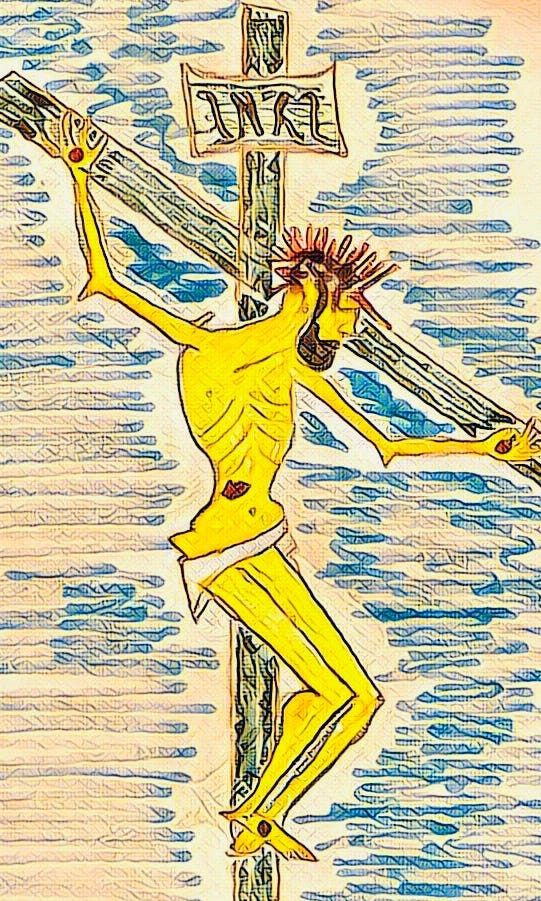An Aural Army
Discipleship is nothing other than Christophonics
(image: Christ Alone by Chris EW Green)
The lectionary Gospel passage for the Fourth Sunday of Easter is from John 10.11-18:
"I am the good shepherd. The good shepherd lays down his life for the sheep. The hired hand, who is not the shepherd and does not own the sheep, sees the wolf coming and leaves the sheep and runs away--and the wolf snatches them and scatters them. The hired hand runs away because a hired hand does not care for the sheep.
I am the good shepherd. I know my own and my own know me, just as the Father knows me and I know the Father. And I lay down my life for the sheep. I have other sheep that do not belong to this fold. I must bring them also, and they will listen to my voice. So there will be one flock, one shepherd. For this reason the Father loves me, because I lay down my life in order to take it up again. No one takes it from me, but I lay it down of my own accord. I have power to lay it down, and I have power to take it up again. I have received this command from my Father."
A little over a century and a half before the birth of Christ, Israel was riven by a bitter, partisan divide that put them on the brink of civil war.
On one side of the conflict were the traditionalists, conservatives allied with Ptolemy, the Pharaoh of Egypt.
On the other side of the fight were the Tobiads— progressives— those Jews who sought to synthesize their covenant customs with the practices and views of the wider pagan world.
The traditionalists ousted the Tobiads from Jerusalem in 170 BC and the Tobiads found exile in Syria under King Antioches Epiphanes. No soon had they arrived in Syria the exiles began lobbying Antioches to invade Israel and restore their party to the power and authority that had been stolen from them. Those who ginned up the incursion got more than they anticipated. At the leader’s incitement, the Temple was stormed and looted. The proceedings in the Temple were halted. The chief priests at work there were hunted and beaten and killed.
As the ancient Jewish historian, Josephus, writes in the Jewish War:
“The king being thereto disposed beforehand, complied with the Tobiads, and came upon the Jews with a great army, and took their city by force, and slew a great multitude of those that favored Ptolemy, and sent out his soldiers to plunder them without mercy. He also spoiled the temple, and put a stop to the constant practice of offering a daily sacrifice of expiation for three years and six months.”
In the aftermath of the violence, Antioches erected an altar to Zeus inside the Temple where the ark of the covenant had once resided. He banned the sign of the covenant, circumcision, and, in the holy of holies— where only the great high priest was clean enough to come— Antioches slaughtered a herd of pigs and smeared their entrails and blood upon the mercy seat.
The breach of the Temple crossed a line.
And it ignited a large scale revolt led by Mattathias, a Jewish priest, and his five sons Jochanan, Simeon, Eleazar, Jonathan, and Judah. A year after the desecration of the Temple, Judah Maccabeus took the mantle from his father, becoming a guerrilla leader, earning the nickname “Judah the Sledgehammer,” and winning the title מָשִׁיחַ.
Messiah.
When his father commissioned him to lead the movement, Judah pledged to “avenge the wrong done by our enemies and to pay back to the Gentiles what they deserve.”Judah the Sledgehammer kept his vow, defeating Antioches two years later and deposing the seditionists.
Upon victory, jubilant Israelites showered Judah the Sledgehammer with shouts of “Hosanna!”
And they rejoiced that perhaps the Sledgehammer was the Shepherd, the Good Shepherd, the Messiah of Messiahs, prophesied by Ezekiel.
As it turned out, no.
After defeating Antioches Epiphanes, Judah turned around and signed a treaty with Rome. The Sledgehammer suffered a failure of imagination and traded one kingdom for another just like it.
But not before Judah became the prototype for the kind of Messiah Israel expected.
Upon his victory over Antioches, over eight days and eight nights, Judah the Sledgehammer cleansed the Temple, turning over the tables of the pagan altars, and instituted a festival to commemorate the Temple’s restoration. Hanukkah.
Or, as the Gospel of John puts it in Sunday’s text (as a FLASHING RED LIGHTBULB CLUE of you, dear reader), the Festival of Dedication.
Keep reading with a 7-day free trial
Subscribe to Tamed Cynic to keep reading this post and get 7 days of free access to the full post archives.


